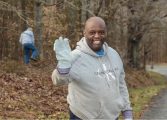By Page H. Gifford
Correspondent
Renowned New York City-based drummer, composer, and jazz musician Graham Doby returns with his quartet to Carysbrook Performing Arts Center on Nov. 15, at 7 p.m. Since his last performance at Carysbrook in 2023, he has been touring Europe, primarily performing throughout Spain, France, and Andorra.
“This past summer, I spent several months living in Europe and began establishing roots in Barcelona and Toulouse. Looking ahead, I’m organizing a European tour for next year with a similar ensemble from New York, continuing to build connections between the U.S. and European scenes,” he said.
The current quartet was formed three years ago with the idea of creating an experimental group focused on playing the most challenging, high-energy music they could imagine.
“As we developed, our goal shifted toward balancing that intensity with accessibility, pushing each other creatively while keeping the music engaging for listeners.”
Doby’s style has been described as “tremendously agile” with a sound of poly-rhythmic jazz fluidity grounded in funk and rock.
“Elvin Jones’ phrasing and intense, polyrhythmic, full sound have always resonated very deeply with me,” he said. “It’s so easy for that style of playing to overpower the other instruments, and for it to not sound musical, but Elvin always finds a way to balance the melodic element of drumming with an intense pedagogy of playing.”
A drummer for over 20 years, Doby discovered his love of jazz when he was 12 years old. In sixth grade, he auditioned for the jazz band at school but wasn’t accepted. He didn’t let that deter him and took the challenge to make it the following year.
“Throughout that year, my dad played jazz recordings consistently around the house; this is where my love for jazz took hold. I became very interested in learning the style and started lessons with Robert Jospé.”
At the beginning of high school, he began playing gigs and says he was lucky to have a high school music teacher, Greg Thomas, who instilled in him the foundation for being a professional musician.
Improvisation is something unique to jazz music, separating jazz artist’s unique sounds. Doby says he has a two-step approach to treating improvisation.
“The first and most obvious is practice. I’ve spent well over the proverbial 10,000 hours practicing, developing the focus and drive to spend hour upon hour honing my craft. This includes listening, transcribing, and practicing rudiments to be able to flow around the kit (drum set) easily,” he said. “The next step is a bit more conceptual. John D’earth once told me, “Don’t worry about what you just played because it’s too late to do anything about it.”
His technical approach also has a philosophical meaning; a meaning familiar to many artists, whether they are musicians, visual artists, actors, or writers. They immerse themselves in their work or performance by giving their passion and soul to it.
“The evolution of this approach is a philosophy of always living in the moment and understanding that one’s playing is an extension of themselves. This takes many years to be comfortable with and more so, is a never-ending process. The idea is that at any moment, you can tap into your foundation of playing and never think about what you are doing. It’s simply an expression of who you are at that moment in time. I don’t look at the drumsticks as sticks, or the bass drum or the pedals as pedals, but more as extensions of my hands, my feet, and my mind. This can be scary at first because you truly are letting go.”
Much of allowing himself to become part of the music is evident when you hear it. Reminiscent of Chick Corea and Chuck Mangione, Doby takes the listener on an unexpected journey through sounds that are mellow and contemporary. If his sounds were colors, it would be on a spectrum between deep turquoise blue and hot chili pepper red.
Doby’s favorite jazz standard to perform was a difficult choice because he says there are so many great standards but says his favorites are other musicians’ originals.
“When I play others’ songs, I get to interpret what someone else wants and how to express that on the drum set, which is always a fun challenge and creative oasis for me.” He said that if he had to pick a standard, he would pick Actual Proof by Herbie Hancock.
“I like playing Actual Proof because it’s a perfect balance between jazz and funk, so you can stretch into different genres throughout soloing. It also has a difficult form and different time signatures, which makes you stay on your toes.”
Doby discusses the balance between preserving traditional jazz with incorporating new and innovative elements into the music. He believes, like many musicians, it is imperative to respect and honor the history of this treasured music. He understands that the study of traditional jazz music is to have a foundation to build upon.
“You can further experiment–not to would be insulting and devoid of substance. I also believe that if the jazz legends no longer with us were still around today, they would be disappointed in how jazz has been so codified. Jazz is a music of innovation, and in my opinion, simply regurgitating the vocabulary of the past does not move the genre forward. It holds it in the same space, which is the antithesis of what jazz is,” he said. “There are some great artists out there today who are playing eclectic and relevant jazz with the incorporation of other genres, and I think this is how the music stays innovative and fresh.”
The format for this upcoming concert features a set with half originals and half covers. Each member contributes to the writing process, therefore everyone has at least one of their compositions featured. The rest of the program includes intricate arrangements of popular songs and a few fusion classics, all approached with our own sound and improvisational energy.
For more information and tickets, visit www.carysbrook.org.




